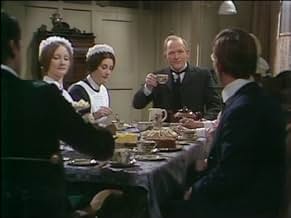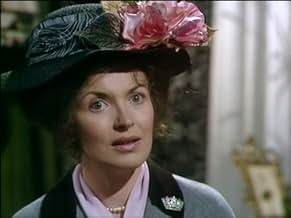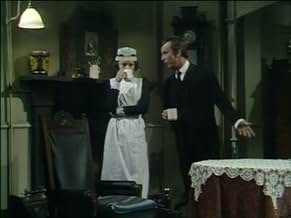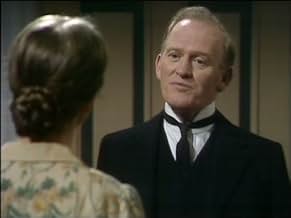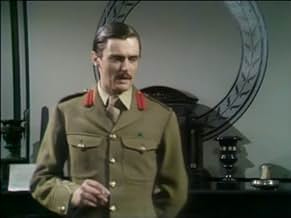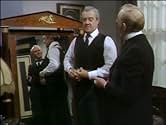Los juicios de los aristócratas británicos de la familia Bellamy y del personal de la casa.Los juicios de los aristócratas británicos de la familia Bellamy y del personal de la casa.Los juicios de los aristócratas británicos de la familia Bellamy y del personal de la casa.
- Ganó 7 premios Primetime Emmy
- 14 premios y 20 nominaciones en total
Explorar episodios
Reseñas destacadas
It wasn't a huge budget that made this series great, immensely popular, much honored, and the biggest hit in PBS history. It was the fabulous writing and the rich characterizations presented to us every week. All these people we cared about, even negatively in the case of James. And that's why even now there is a U/D web site. Interwoven were the historical events of Edwardian England stretching through World War One into the Twenties. The series reached it's peak halfway through the war with "Women Shall Not Weep" - a magnificent episode available on video. By the Twenties the upper class was cracking more than the lower - a theme of the series. U/D was such a hit America tried its own hand at the wealthy/servants scenario with "Beacon Hill" - highly touted but dismally written flop. Special credits to Jean Marsh as Rose (who never found happiness, but wouldn't have been happy anyplace but the world she was brought up in!); Marsh also was a creator of the series. It was an absolute joy.
P.S. In case the credits don't reflect this, Daisy's last name was 'Peel".
P.S. In case the credits don't reflect this, Daisy's last name was 'Peel".
Set from pre-World War I to the late 1920s, this series ran for five years and was a cornerstone of ITV drama in the UK.
Co-created by Jean Marsh and debuting in good old black and white, before moving into colour, 'Upstairs, Downstairs' remains the best (and the soapiest) drama of above and below stairs.
Too many people in the cast to mention, but kudos should go to David Langton, who played Richard Bellamy throughout, to the two Lady Bellamys, Rachel Gurney and Hannah Gordon, to Simon Williams and Nicola Pagett as James and Elizabeth, and Lesley Anne Down as Georgina.
Below stairs there were three key characters - Gordon Jackson as Hudson the butler, Angela Baddeley as Mrs Bridges the cook (a character so famous she had her own range of biscuits and preserves for many years), and Jean Marsh as Rose, the house-parlourmaid. I also remember Karen Dotrice as Lily, Jacqueline Tong as Daisy, John Alderton and Pauline Collins as Thomas and Sarah (who got their own spin-off series), and Christopher Beeny as Edward.
Full of drama - the Titanic disaster, debt collectors, intrigue and affairs, and of course the obligatory conflict between ranks, this series had it all. It enjoyed several repeat runs on TV and now has a new life on DVD, well-deserved.
Highly recommended if you've never seen it; if you have you don't need convincing.
Co-created by Jean Marsh and debuting in good old black and white, before moving into colour, 'Upstairs, Downstairs' remains the best (and the soapiest) drama of above and below stairs.
Too many people in the cast to mention, but kudos should go to David Langton, who played Richard Bellamy throughout, to the two Lady Bellamys, Rachel Gurney and Hannah Gordon, to Simon Williams and Nicola Pagett as James and Elizabeth, and Lesley Anne Down as Georgina.
Below stairs there were three key characters - Gordon Jackson as Hudson the butler, Angela Baddeley as Mrs Bridges the cook (a character so famous she had her own range of biscuits and preserves for many years), and Jean Marsh as Rose, the house-parlourmaid. I also remember Karen Dotrice as Lily, Jacqueline Tong as Daisy, John Alderton and Pauline Collins as Thomas and Sarah (who got their own spin-off series), and Christopher Beeny as Edward.
Full of drama - the Titanic disaster, debt collectors, intrigue and affairs, and of course the obligatory conflict between ranks, this series had it all. It enjoyed several repeat runs on TV and now has a new life on DVD, well-deserved.
Highly recommended if you've never seen it; if you have you don't need convincing.
I first viewed this series in the 1970's on PBS and have taken up the habit again. It is just so entertaining and classy that I can't shake my addiction to this wonderful period drama. Sadly, most of the actors have passed, only the younger ones are still alive. But that doesn't reduce the rich legacy of the whole cast. During the five seasons of this series, viewers witness the evolution of an aristocratic London family from 1901 to the early 1930's.
We journey with the family upstairs and their downstairs staff through many of the pivotal events of the era: the Titanic disaster, the Great War, the clash between labour and wealth, the market crash and depression. Not all the episodes are riveting but most of them kept this viewer transfixed to the screen. Lord and Lady Bellamy, performed by David Langton and Rachel Gurney, are the main characters upstairs as the series begins. Richard Bellamy is a Member of Parliament; Lady Marjorie, who comes from the landed gentry, oversees the staff with grace and a strict code of behaviour. She has her society friends and Lord Bellamy comes in touch with the leading figures of the day, from Lloyd George to Churchill. We even watch the family welcome Edward VII, the King of England, whose visit is punctuated by a servant giving birth.
Downstairs is dominated by the butler Angus Hudson, performed by Gordon Jackson, as an upright, no-nonsense Scot who runs the household with admirable efficiency and strict discipline. Angela Baddeley is the cook, a true perfectionist in the kitchen who tolerates no insubordination. If things go wrong, she can become unhinged until Hudson steps in to calm her down. Jean Marsh, who conceived the series with Eileen Atkins, is the head parlourmaid, Rose. Rose typifies many of the changes going on in her world and manages to be a friend and confidante to characters upstairs and down. Atkins never did appear...more the pity, but with the rest of this stellar cast, the series always sparkled anyway.
The cast changes as time passes and some remain to the end. Some characters with minor roles rise in prominence and more prominent ones disappear or recede. In this respect, it resembles family life in any era. The audience feels like a fly on the wall over the period as we see the intimate details of the lives of characters upstairs and down amid the changing face of British society. When the series ends, we feel the loss of the characters but with a great sense of satisfaction for knowing them and the world in which they lived.
We journey with the family upstairs and their downstairs staff through many of the pivotal events of the era: the Titanic disaster, the Great War, the clash between labour and wealth, the market crash and depression. Not all the episodes are riveting but most of them kept this viewer transfixed to the screen. Lord and Lady Bellamy, performed by David Langton and Rachel Gurney, are the main characters upstairs as the series begins. Richard Bellamy is a Member of Parliament; Lady Marjorie, who comes from the landed gentry, oversees the staff with grace and a strict code of behaviour. She has her society friends and Lord Bellamy comes in touch with the leading figures of the day, from Lloyd George to Churchill. We even watch the family welcome Edward VII, the King of England, whose visit is punctuated by a servant giving birth.
Downstairs is dominated by the butler Angus Hudson, performed by Gordon Jackson, as an upright, no-nonsense Scot who runs the household with admirable efficiency and strict discipline. Angela Baddeley is the cook, a true perfectionist in the kitchen who tolerates no insubordination. If things go wrong, she can become unhinged until Hudson steps in to calm her down. Jean Marsh, who conceived the series with Eileen Atkins, is the head parlourmaid, Rose. Rose typifies many of the changes going on in her world and manages to be a friend and confidante to characters upstairs and down. Atkins never did appear...more the pity, but with the rest of this stellar cast, the series always sparkled anyway.
The cast changes as time passes and some remain to the end. Some characters with minor roles rise in prominence and more prominent ones disappear or recede. In this respect, it resembles family life in any era. The audience feels like a fly on the wall over the period as we see the intimate details of the lives of characters upstairs and down amid the changing face of British society. When the series ends, we feel the loss of the characters but with a great sense of satisfaction for knowing them and the world in which they lived.
Probably the best TV series ever! For someone Anglophile like me it is the perfect time machine to enter a typical household of the Victorian/Edwardian era. Although it shows an "upper class" household, the focus is on the "downstairs" personnel. The problems and stories of the kitchen maidens, footmen etc are much more colorful and sympathetic than the actions of "her ladyship" and Lord Bellamy upstairs. Nevertheless absolutely all characters are designed thoroughly, sympathetic and authentic. Furthermore this series shows a sort of real "theater" which has left TV long time ago and will never appear again! Long close-ups which show the affection of every actor, long dialogs with full sentences and - long pauses between them to enable the actors and the viewer to reflect everything. In addition the fine set design, the costumes, the "funny stuff" around, for example an early - hand-crafted! - vacuum-cleaner! Another extraordinary fact is the combination of fictional characters with real history: Everything finds its way into the story, the death of Queen Victoria, the Titanic Disaster, WW I, the Spanish Influenza, Wall Street and so on. A period of nearly 30 years is described, and with the last episode you are crying, just because you wish to know how everything will continue... But, that was a lack of this absolutely brilliant series: The main characters hardly age during the decades! Butler Hudson and cook Mrs. Bridges for example are already "old people" in the first episode, playing 1901. In the last episode - 1929 - they have not changed in any way, they even plan to "start a new life", running a small guest-house. After having seen it in German TV, where several episodes are not shown, I bought the complete DVD edition and can only recommend this to everyone!
10bw92116
No other television drama made in any country has equaled or surpassed this one in quality from the beginning to the end of the series. Interesting and relevant themes, historical background, outstanding writing, plots, characters, sets, direction, acting, photography, editing - every aspect is executed brilliantly and and so well that you don't even notice them. And yet it's more than just the sum of those elements - it's a complete package that is compelling and unforgettable. What else can you say? This is a milestone in television production. If you haven't seen it, you're missing a major event in television history. Get the entire series, and watch all 68 episodes, in order. You will never forget this show.
¿Sabías que...?
- CuriosidadesWhen Angela Baddeley went to Buckingham Palace to receive the C.B.E. (Commander of The British Empire) awarded to her in the Queen's 1975 New Year's Honour's List, she discovered that this was Queen Elizabeth's favorite television program and Mrs Bridges was her favorite character.
- PifiasHamish and Dorothy Matthews' names are spelt Mathews in the credits of episode 3.11 and Matthews in episode 4.6
- Citas
Edward Barnes, footman: Arabella? That's a COW'S name!
- ConexionesEdited into Upstairs Downstairs Remembered: 25th Anniversary (1996)
- Banda sonoraThe Edwardians: Theme from Upstairs Downstairs
(uncredited)
Composed by Alexander Faris
[series theme tune]
Selecciones populares
Inicia sesión para calificar y añadir a tu lista para recibir recomendaciones personalizadas
- How many seasons does Upstairs, Downstairs have?Con tecnología de Alexa
- How many episodes in the series?
Detalles
- Fecha de lanzamiento
- País de origen
- Idioma
- Títulos en diferentes países
- Arriba e abaixo
- Localizaciones del rodaje
- 65 Eaton Place, Belgravia, Londres, Inglaterra, Reino Unido(the Bellamys' house - 165 Eaton Place)
- Empresas productoras
- Ver más compañías en los créditos en IMDbPro
- Duración1 hora
- Color
- Mezcla de sonido
- Relación de aspecto
- 1.33 : 1
Contribuir a esta página
Sugerir un cambio o añadir el contenido que falta

Principal laguna de datos
By what name was Arriba y abajo (1971) officially released in India in English?
Responde






